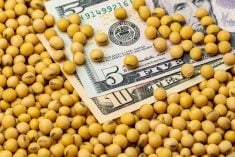Reuters — Pilgrim’s Pride Corp. on Tuesday offered to buy Hillshire Brands in an all-cash deal valued at US$6.4 billion, as the world’s second-largest chicken processor seeks to expand its protein footprint with Hillshire’s sausages and lunch meats.
Shares in Hillshire soared almost 23 per cent on word of the bid, which landed two weeks after the maker of Hillshire lunch meats and Jimmy Dean Sausages offered to buy Pinnacle Foods, known for its Birds Eye frozen vegetables, in a $4.3 billion deal (all figures US$).
Pilgrim’s competing overture, which requires Hillshire to drop its Pinnacle bid, also signaled an aggressive return to deal making by Brazilian meatpacking giant JBS SA, which owns about 75 per cent of Pilgrim’s and recently cut its debt.
Read Also

U.S. grains: Soy futures post biggest monthly gain in nearly five years on China trade optimism
U.S. soybean futures climbed to a 15-month high and posted their biggest monthly gain in nearly five years on Friday following a rally fueled by the prospect of revived exports to China.
A buying spree launched in 2005 transformed JBS into the world’s biggest beef producer with more than 14 major acquisitions in six years, including U.S. rivals Swift, Smithfield Beef and Pilgrim’s Pride.
Growing global appetite for meat also has fuelled other big protein deals, including last year’s roughly $5 billion acquisition of pork giant Smithfield Foods by China’s WH Group, previously known as Shuanghui International Holdings.
Investors were cool on a Hillshire-Pinnacle marriage and sent shares down roughly six per cent in intraday trading when the proposal came on May 12.
Under that deal, Hillshire would suspend share buybacks, take on debt of $2.3 billion and expand into areas that are out of synch with U.S. consumers’ appetite for fresher food.
“Makes more sense”
J.P. Morgan analyst Ken Goldman in a client note called Pilgrim’s offer both strategically and financially superior to the Pinnacle deal.
“That’s more like it,” Goldman said. “Joining two protein companies makes a lot more sense than marrying a meat company with one that has a focus on frozen vegetables.”
Pilgrim’s CEO William Lovette said in a letter to Hillshire that “our proposal will no longer exist if the proposed acquisition of Pinnacle is consummated.”
Hillshire said in a statement it continued to “strongly believe in the strategic merits and value creation potential” of the Pinnacle merger, but would thoroughly review the Pilgrim’s Pride proposal.
Pilgrim’s offer of $45 per share represents a premium of about 22 per cent to Hillshire’s closing share price on Friday.
Pilgrim’s also would pay a termination fee of $163 million to Pinnacle and assume Hillshire’s long-term debt of about $840 million.
Pilgrim’s, which sells fresh chicken under brands such as Pilgrim’s and Country Pride, said it expects the Hillshire deal to close in the third quarter and to be immediately accretive to earnings per share. It expects to fund for the deal with existing cash and third party financing.
U.S. antitrust regulators would determine if the Pilgrim’s-Hillshire deal means that American lunches and dinners could become more expensive because there are too few competitors to prevent large firms from unfairly raising prices. Sometimes firms sell assets to win deal approval.
One antitrust expert urged regulators to take a hard line.
“The evidence is quite clear that these deals lead to less for the farmer and higher food prices,” said David Balto, a veteran of the Federal Trade Commission now in private practice.
— Lisa Baertlein and Devika Krishna Kumar report for Reuters from Los Angeles and Bangalore respectively. Additional reporting for Reuters by Brad Haynes in Sao Paulo and Diane Bartz in Washington.











